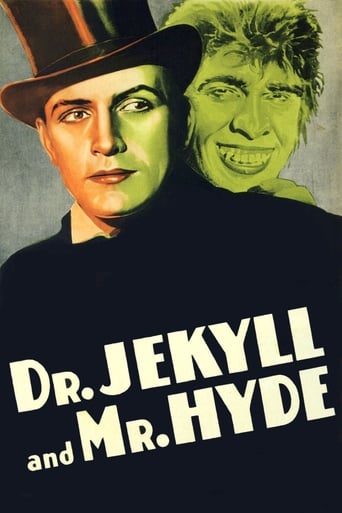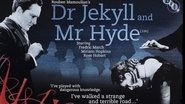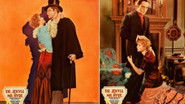BA_Harrison
Paramount gives Universal a run for their money with this excellent adaptation of Robert Louis Stevenson's novel Strange Case of Dr Jekyll and Mr Hyde.Fredric March stars as well-meaning Dr. Henry Jekyll, who is convinced that a person's soul consists of two halves, the good self and the bad self, and that mankind would benefit if he could banish the bad and liberate the good. In his laboratory, Jekyll perfects a potion that will separate the two sides of his personality and uses himself as a guinea pig. The formula allows Jekyll's repressed bad self to take control and, as his new alter ego Mr. Hyde, the doctor enjoys the forbidden fruits of old London town.If only Dr. Jekyll wasn't so sexually frustrated, things might have turned out differently. Engaged to be married to the lovely Muriel Carew (Rose Hobart), but made to wait for months on end by his future father-in-law Brig. Gen. Danvers Carew (Halliwell Hobbes), Jekyll has a serious case of blue balls; it is this that causes Hyde to come to the fore. As his monstrous bad self, free of all morality and decency, he is able to indulge in every animalistic whim, taking a mistress, variety hall girl Ivy Pearson (Miriam Hopkins), and treating her like a sex slave.Of course, none of this is any good for Jekyll's relationship with Muriel, especially with Hyde eventually being able to take control without the need for the potion.Not only does Dr. Jekyll and Mr. Hyde boast an Oscar winning performance from Fredric March, it also benefits immensely from outstanding direction from Rouben Mamoulian, whose innovative film-making approach makes the film a marvel to behold. Opening with a wonderful extended POV shot as Jekyll plays the organ and prepares to give a lecture, Mamoulian executes a variety of ground-breaking techniques (the mirror trick is still impressive, even to this day) and makes effective use of his atmospheric foggy London sets. Made in Pre-Code Hollywood, the film also packs in quite a bit of racy material, Ivy stripping to get ready for bed (Hopkins giving a brief flash of side-boob) and Hyde promising the poor, terrified girl a night to remember.An excessively mawkish scene in which Jekyll eventually confronts Muriel, telling her that he must set her free, probably would have aged better if the melodrama had been toned down a bit, but other than that the film is simply terrific—up there with Frankenstein and The Invisible Man as one of the greatest classics of the era, and of the genre as a whole.8.5 out of 10, rounded up to 9 for IMDb.
lasttimeisaw
This dichotomous horror cinema progenitor which ripsnortingly delves into the sordid underside of human psyche, is directed by the Hollywood's maverick innovator Rouben Mamoulian and made just shy of the scourge of Production Code. From its unorthodox opening sequences, shot with an ovoid vision-bounded subjective angle, immediately viewers realize they are watching something novel, intriguing and challenging the normalcy of our ocular perception of the silver screen. Even appraised in this day and age, Mamoulian's sleight-of-hand still resoundingly holds court. In the Victorian London, the respectable Dr. Henry Jekyll (March) concocts a potion which can turn himself into an alter ago of his dark side, Mr. Hyde, whose appearance also changes into a primitive, simian-like reprobate and is immune to any conscience and morality. One of the most extraordinary visual tricks from Mamoulian is the deceptively uninterrupted close-up of Jekyll's visage morphing into Hyde's under our direct scrutiny, which he would spill its magic beans decades later. Also, prominent and equally impressive is his implement of montages, in particular during Dr. Jekyll's first transmogrification, a hallucinogenic concatenation of the extrinsic incentives which tease out a decent man's darkest facet. A whey-faced Fredric March wins his first BEST ACTOR Oscar award (shared with Wallace Beery in King Vidor's THE CHAMP 1931) for buckling down this Janus-faced showcase and rendering it with both ample empathy and pathos, Jekyll's repeated frustration of consummating with his sweetheart fiancée Muriel (Hobart) works up as the primal trigger of Hyde's unleashing and persistence, it is rather incisive to link a human's sexual impulse with his dark side, a motif naturally falls in with Victorian mores and codes of behavior, and looking back, how to lift "sex" from the list of taboos really signifies a big step to understand humanity,The two actresses serve as trimmings under March's duopoly, are diametrical in their social statuses, but not so much in their abject thirst of love and blind subjugation to Jekyll's gentleman-like front: Miriam Hopkins' terrorized Ivy Pierson is incredibly harrowing when we all too well really that she is doomed in the cul-de-sac, and Rose Hobart's ladylike meekness might reflect what one deems as a noble and devoted wife-to-be then (don't give up your man no matter what), but teeters on the brink of mawkishness quickly seen through a more critical eye. With all the classic oldies now in vogue for revamping and retrofitting, Robert Louis Stevenson's timeless warhorse could be well infused with a progressive spin (human iniquity is a gold mine to milk) to exhort younger generations, but Mamoulian's ingenuity is nevertheless, substantially nonpareil.
JohnHowardReid
Nowadays it is extremely fashionable for critics to praise Mamoulian's version at the expense of Fleming's. After all, Mamoulian has a much higher status as an auteur than Fleming. Why? Fleming died in 1947 whereas Mamoulian was attending retrospectives and giving interviews well into the 1970s. Furthermore, his comparatively small body of work — 16 films over a 28-year period — makes the job of researching so much easier, leading to a proliferation of articles, theses and career studies. In addition, the 1931 version has attained a cult status due its purchase and subsequent suppression by MGM. (And no wonder they hid it away. Although Mahin receives sole screen credit, not only the adaptation — with its introduction of the Ivy character who is not present in Stevenson's line-up — but many of the scenes themselves are a direct steal.Despite the similarities, Mamoulian's is really a somewhat different film, looking at Hyde from a less moralistic angle. His direction is much more showy than Fleming's with its imaginative first-person camera and ingenious slow wipes. Both films have the benefit of no- expense-spared period sets and marvelously atmospheric photography.March's Hyde with its grotesque make-up and spell-binding special effects is one of the highlights of 30s cinema. The actor won an Academy Award for his performance, but deserved it more for his projection of the incarnately evil Hyde than his portrayal of the somewhat simpering Jekyll. Tracy's Hyde has an equally fascinating malevolence, but his Jekyll is much more forthright and believable. And despite the technical brilliance of March's transformation (compared to the obvious if increasingly skilled use of superimposition for Tracy's), the climactic scenes in the Fleming film are more effectively handled and set. (The climax starts about three-quarters of the way through when the transformation unexpectedly takes place of its own accord. Hyde suddenly becomes the dominant personality, taking refuge in Jekyll primarily to escape detection. The Mamoulian climax starts with Jekyll sitting on a park bench, listening to a nightingale and quoting Keats while a black cat stealthily advances on her prey — an effective metaphor, but Fleming's is even more vivid: Tracy goes whistling off in the fog to his engagement party. He disappears into the mist. The whistling continues jauntily, hesitates and stops. Cut to a close-up of Tracy, slightly bewildered. He starts off again, once more sauntering gaily into the fog, but this time he is whistling not the Lana Turner theme but "See Me Dance the Polka".) Not only is Tracy more than a fair match for March, but producer Fleming has surrounded him with an absolutely first-rate support cast. Ingrid Bergman's remarkably luminous yet sexually provocative performance (this was her 4th American film, following Intermezzo, Adam Had Four Sons and Rage In Heaven. Her next film was Casablanca) far outshines Miriam Hopkins'. Of course, we expect a skilfully charming performance from Ingrid. What is even more of a surprise is the appealing conviction Lana Turner brings to the heroine. (Oddly enough the roles were originally reversed, but Bergman persuaded Fleming to let her try her hand at a "bad girl".)Ian Hunter is perfectly cast as the stolid Lanyon (yet so much more personable than Holmes Herbert in the Mamoulian version), while Peter Godfrey brings a lively yet sensitive spirit to Poole. Donald Crisp purrs his usual warm authority into Sir Charles and there are some delightfully animated character cameos from both upper (Lawrence Grant's indignant Dr Courtland, Aubrey Smith's smooth- tongued bishop) and lower (Billy Bevan's talkative park attendant, Alec Craig's inflexible waiter, Forrester Harvey's mendacious manager) classes. While not as showy as Mamoulian's, Victor Fleming's direction is equally as sophisticated, using a great variety of effective camera angles and dramatic compositions, allied with a superb sense of atmosphere and a masterful knowledge of pace and movement. Right from its opening credits to its fade-out 127 minutes later, the narrative grips like the proverbial vice, no matter how familiar you are with the story or how many times you've seen the film before. The credit for this mounting excitement and suspense must be shared with the players, the writers, and the other technicians. Tracy never gave a more electrifying performance. His Hyde is achieved with comparatively little make-up (compared to March's), the menace conveyed primarily through a change in voice and demeanor. Mahin has supplied him with some fascinatingly malicious dialogue. Even when stealing scenes direct from Heath and Hoffenstein, he usually improves them. For example, Tracy's famous line, "Even as Hyde I warned you", is missing from Mamoulian, leaving March's motive in warning Lanyon completely unexplained.(As noted above, both scripts have been considerably fleshed out from Stevenson's original novel, while retaining much of its flavor and many of its ideas — principally that Jekyll's vice is from the very first a deliberate assent — rare themes indeed for Hollywood, especially i
christopher-underwood
Yes, it creaks a bit here and there and has sometimes the look more of a silent film, but this is an easy talkie and a pre-code one at that. In fact there is much innovation here with audacious camera work and bold wipes from one scene to another. It is some time since I last saw this but it still retains its power. And its vigour! I was surprised all over again at the near nakedness of Miriam Hopkins in her scenes of seduction - that is seduction by her of all things. Later she will suffer as her resonating call to return echoes in the mind of Jekyll/Hyde. There is much talk at first of the true nature of man, the seeming duality of the noble and the base and the social hypocrisies and if in the end it becomes a little more farcical it still retains its power. It will be many years until the issues of sex and violence are so vividly portrayed or explored and this version of the book, albeit more based upon an early stage play will forever remain an essential cinema classic.





